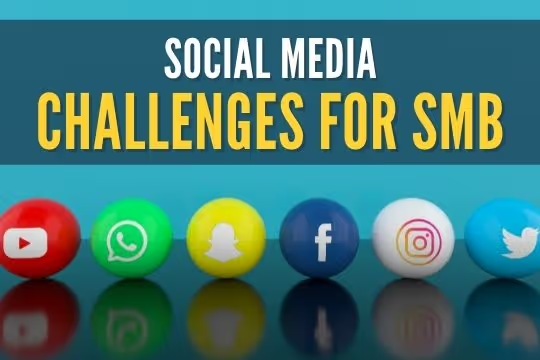

Signing up for social media accounts introduces you to thousands of people, but it's not as simple as making an account and waiting for sales to increase. Small businesses face social media challenges that tempt them to delete their accounts and focus on "traditional" advertisements instead.
These challenges don't have to derail your marketing strategy. In fact, they teach you how to market your business and pick up customers that your competitors lost. Note these challenges when you come across them, then use these tips to turn a hassle into a learning experience.

Small businesses often have no idea how much money to spend on marketing. Some businesses are tempted to spend half their profits while others throw out $20 for a promoted post. Generally, small businesses should spend about 8% of their budget on marketing. This helps them gradually reach an audience without spending more than they can afford.
When the business launches its social media profile, its first followers include friends, relatives, and people in their neighborhood. Occasionally, they get followers from advertisements. However, they can't seem to build a loyal following--and new followers often leave after a few months. Posting more often just makes their follower account drop even more.
To stay relevant, companies need branded photo content, informative blog posts, thought-provoking questions, and entertaining videos. People outside your social circle won't follow an account full of advertisements. However, they'll follow an account that teaches and entertains them and recommend the account to others.
After a period of growth, some businesses abruptly plateau. Their stream of new followers slowed to a trickle, and they can't figure out how to reach a fresh audience. Sales and page traffic stagnate until the business can't cover monthly expenses. The company buys promoted posts, but they never reach a new following.
These companies need to rethink their strategy so they don't lose their momentum. If they usually post text and images, they might experiment with other forms of content, like videos and live streams. They could reconsider their audience and how they should market their products. While they shouldn't stray too far from their brand identity, a fresh outlook could break their stagnation.

When they develop their social media strategy, many small businesses assume that they should sign up for every platform. Instagram, Facebook, Twitter, and TikTok have different audiences, so why not reach as many people as possible? Unfortunately, trying to manage four or five social media accounts overwhelms the company, resulting in abandoned accounts and low-quality content.
Instead of signing up for every platform on the Internet, companies should focus on a few platforms that reach their target audience. A business that sells products aimed at people in their 50s won't find an audience on TikTok, but they'll reach more people on Facebook, which appeals to an older demographic. This maximizes the company's time spent on each platform.
Many new businesses don't realize that they have to engage their followers. They assume that opening an account and making daily social media posts is enough--and if they don't gain followers, it's because their business isn't successful. In fact, the company simply needs to learn how to communicate with followers, boosting its sales and credibility.
The best way to engage followers is by asking questions, responding to comments, and following back. On a less frequent basis, they offer giveaways with prizes for followers who complete an activity, like tweeting a hashtag. Companies on Instagram can host live video chats where followers speak directly to the founders.
Major social media platforms offer "verified" accounts for celebrities, popular influencers, and companies with large followings. When a company just starts out, it won't qualify for the "verified" checkmark. This automatically creates a disadvantage because customers are more likely to shop from a verified business with thousands of followers.
Each platform has different rules for qualification. Generally, companies can apply when they have large audiences and professional content. Reaching out is free, so contact each platform to see what you need to do for verification. Your credibility skyrockets when you have a verified account, placing you alongside major corporations like McDonald's and Yankee Candle.

Collaborating with an influencer introduces the company to a wide audience, builds their credibility, and makes connections that they could use in the future. However, small businesses have trouble forming collaborations. An influencer with half a million followers won't work with a company with less than a thousand--and even if they wanted to, the company doesn't have much to offer them.
Small businesses need to develop a following and polish their social media strategy before they reach out to influencers. Once they have a following and products or services to offer, they can frame the collaboration as a mutually beneficial partnership instead of a one-sided advertisement. This could expose the business to hundreds of thousands of followers.
One of the biggest social media challenges for a small business is earning a following. They signed up for Twitter and Instagram, added their branding, and posted informative, engaging content. Despite their efforts, they're not earning followers, which means they're losing money on social media marketing.
Small businesses need a little push to start gaining followers. One technique involves buying promoted posts, which show up in users' feeds even if they don't follow the account. Another technique utilizes hashtags so the post appears in search results. For example, if a user searches "makeup tutorials" on Instagram, a post that includes the "#makeuptutorials" tag will appear.
With multiple accounts scattered across different platforms, small businesses struggle with brand consistency. Their Instagram account has outdated photos while their Twitter account has no logo. If a different person manages each account, the varied writing styles make the business look disorganized. Customers don't have a clear image of the company in their minds because the branding is scattered.
Instead of viewing each social media account as a different entity, companies need to evaluate their accounts as a whole for a comprehensive marketing strategy. They'll create branding, logos, a color scheme, and a brand "voice" that remain consistent across social media, promoting brand recognition and showing off their professionalism.

The business has done everything right. They post quality content, interact with customers, promote their posts, and earn a steady stream of followers. And yet, they can't make the personal connection that turns a transaction into a partnership. When customers make a personal connection, they'll choose the business over a competitor that--to them--seems like a faceless corporation.
Small businesses make personal connections by showing the people behind the products. They introduce themselves with photos and videos, show followers what they're working on, talk a little about their days and sincerely interact with customers instead of relying on generic dialogue. While they maintain a professional distance, they make followers feel like friends instead of clients, which creates a loyal, dedicated following.
Social media challenges for a small business can be overwhelming, and the small business marketing pros at E-Marketing Associates are here to help. Our products are designed to help small businesses grow to help you stay ahead of the competition.